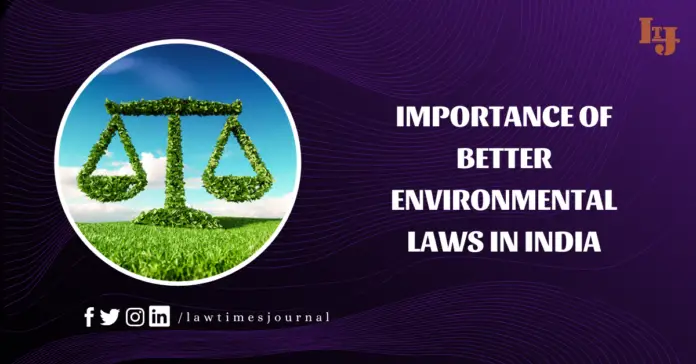
Environmental problems
The environmental problems refer to those problems which are related to environment. It can be water, air, noise, animals etc related to any of these. There has been a gradual decrease in the quality of healthy environment due to activities of human beings. The activities which are causing the environmental pollution need to be regulated. The problems need a strict solution so that further exploitation of resources can be stopped. Various laws have been enacted which perform their roles by imposing penalties and providing various rules and regulations but, their implementation is not proper. Due to this, the degradation is increasing at a fast pace.
Environmental Laws In India
The main environmental laws which are presently active in India are:
- The National Green Tribunal Act, 2010: The Act was enacted with an aim to establish the National Green Tribunal for the speedy disposal of the pending cases. Also, for the protection of the trees and forests. Also, for the protection of other natural resources too.
- The Water (Prevention and Control of Pollution) Act, 1974: The Act aims at preventing the water from pollution in ways such as prohibiting the discharge of pollutants in the water bodies. Also, the penalties for the people who do not follow the rules and regulations mentioned ion the act and pollute the water bodies.
- The Air (Prevention and Control of Pollution) Act, 1981: The Act provides for rules and regulations to be followed by the people in order to stop the air pollution along with some penalties.
- The Environment Protection Act, 1986: The Act provides for measure that can be taken to find long term solutions to prevent the environment from pollution and degradation. The Act also enables government to take necessary steps for the protection of environment.
- The Wildlife Protection Act, 1972: The Act aims at saving the wildlife and to prevent illegal trade of the animals including smuggling and hunting.
- The Forest Conservation Act, 1980: The Act aims at preserving the forests of country. It also provides for measures to be taken to protect the forests from exploitation.
The Acts collectively provide for the conservation of the environmentand are related to the prevention of air and water from pollution. The Acts also set the limits for some activities of humans so that such activities do not lead to exploitation of the natural resources. All the acts are interconnected to each other.
Criticisms
- The people are not well aware of the implementation of the laws.
- the laws provide for one-way solutions.
- the control mechanism of the pollution remains ineffective due to the system of following rules and regulations. The acts of air and water provides for the commands more than solutions.
- though the industries are bound to take permissions for discharging effluents but, there are no strict restrictions and penalties due to which companies do not comply to the rules and laws.
- the laws only provide for the solutions for safe guarding the environment. The laws lack in providing the solutions from both the sides equally.
- the funds are not properly used by the governments which in turn leads to their scarcity and this leads to non- implementation of the laws.
- the inelasticity of the laws leads to improper decisions.
- there are no laws against some of the hazardous elements and the legislations are restricted only to some of the components.
- the restrictions to the state government as they are bound to take permissions from the central government for every step they take.
Need for better environmental laws
The above-mentioned criticisms of the present legislations carve a way for better environmental laws in the country. The need for the environmental laws is an urgency as the environment in the country is degrading. The mains reasons for the poor implementation of the laws
- The laws are elastic in nature, so that the conditions of the environment can be looked after in a better way.
- the stricter punishments for the people not following the rules mentioned in the legislation because the non-providence of strict punishments give people liberty to go against the laws.
- The liberty to state governments for taking necessary steps without taking permission from the central government so that instant actions can be taken against problems.
- The laws which can maintain the balance between the needs of human and protection of environment because the present legislations are mainly inclined towards the protection of environment which is not possible as the needs of human beings cannot be fully ignored.
- The Act of wildlife protection fails in its implementation and this gives rise to the need of a law which can save the species from becoming endangered. In recent past, there have a gradual decrease in the wildlife species. The prevention can be done by the implementation of laws which will provide for the better ways.
- The laws that will help in sustainable development are a necessity.
Conclusion
The present environmental laws lack in proper descriptions, strict punishments, proper implementations, are inclined only to the environment perspective, lack in providing the ideas of sustainable development. The need for new legislations are also for increasing the awareness amongst people about some unknown factors.
Edited by Pushpamrita Roy
Approved & Published – Sakshi Raje








